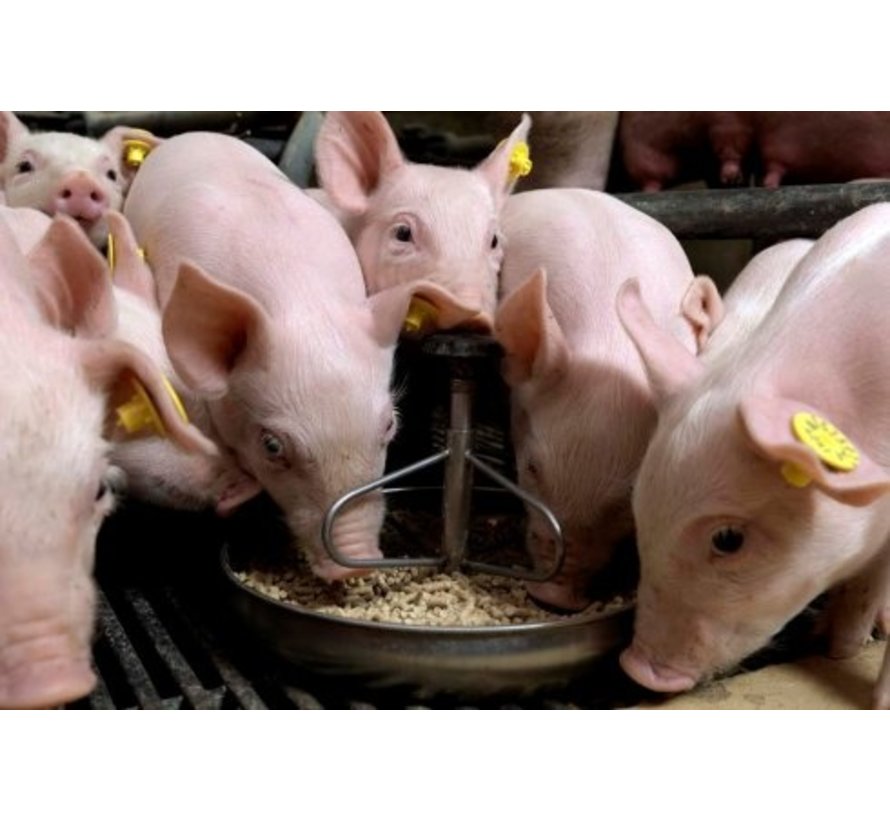Hepatitis E infection from pork?
This test measures Hepatitis E antibodies.
Hepatitis E-Virus-Ak (IgG) Hepatitis E-Virus-IgG antibodies. HEV-Ak from serum.
Hepatitis means inflammation of the liver. The word hepatitis is derived from Greek. Hepar means liver and itis means inflammation. Hepatitis E is caused by the hepatitis E virus. This is a different virus than hepatitis A, B, C and D. All of these forms are caused by a virus. Therefore, we speak of viral hepatitis.
Hepatitis E occurs worldwide, including the Netherlands. The symptoms of hepatitis E are similar to those of hepatitis A.
Hepatitis E usually heals within one to four weeks and is almost never serious. The body clears the virus itself.
It is estimated that the time between infection with the virus and the onset of symptoms is two to eight weeks. We call this the incubation period. Most people do not get any symptoms. People with reduced resistance can develop symptoms.
Hepatitis E can become chronic in people with severely reduced resistance. Transplant patients have a reduced resistance because they receive medication that suppresses the immune system. Chemotherapy or a serious illness can also reduce resistance, preventing the body from clearing the virus.
There are 4 types:
- Type 1 occurs in Asia and Latin America
- Type 2 occurs in Africa and Mexico
- Type 3 occurs worldwide, including the Netherlands
- Type 4 occurs in eastern Asia and central Europe
The symptoms and course of illness of hepatitis E are similar to those of hepatitis A. Hepatitis E usually heals within one to four weeks and almost never develops severely. Most people do not develop any symptoms.
Symptoms that may occur with hepatitis E are:
- nausea
- fatigue
- little appetite for food
- fever
- muscle and joint pains
- a feeling of flu
- pain in the upper abdomen on the right side
- yellowing of the whites of the eyes and the skin
- dark urine
- light-coloured stools (grey-white)
Hepatitis E can be severe in people with impaired immunity. Resistance may be reduced by taking medications that suppress the immune system, for example:
- post-transplant
- during chemotherapy
- in case of a serious illness
A blood test can be used to diagnose hepatitis E. The blood is tested for the presence of antibodies against the hepatitis E virus. Antibodies are detectable in the blood from about two to six weeks after infection.
The cause of hepatitis E is infection with the hepatitis E virus. The virus causes inflammation of the liver. The virus occurs worldwide. There are several types of the virus. In the Netherlands only type 3 occurs. This is a different type than occurs in developing countries. In developing countries, contamination through contaminated drinking water and food is most common.
It is not known exactly how people become infected with the hepatitis E virus in the Netherlands. Human-to-human transmission is very small. The virus can be found in the meat and stool of pigs, deer and wild boar, among others. Infection with hepatitis E can occur by eating contaminated food, such as pork that has been inadequately heated, and through contaminated blood.
Since 2014, the number of people infected with hepatitis E has risen sharply in the Netherlands. The cause of this is not yet clear.
The Central Veterinary Institute (CVI), the Netherlands Food and Consumer Product Safety Authority (NVWA) and the National Institute for Public Health and the Environment (RIVM) are investigating whether pigs play a role in this. It is being investigated whether there are also other sources of contamination.
Some time ago the Sanquin blood bank examined a number of pork products. The hepatitis E virus was found in 78% of the liver sausages and 80% of the liver pâté tested. The NVWA has confirmed this with its own research. Liver sausage and liver paté are products that have not been properly heated.
As a result of this research, the RIVM drew up dietary advice in June 2016. This advice is for people who have had a transplant and are taking medication that suppresses the immune system. In them, hepatitis E can become severe and there is a greater risk of chronic hepatitis E.
For transplant patients, hepatitis E can be harmful. Therefore, the RIVM advises people who have undergone transplantation not to eat products containing pork liver that has not been properly cooked. This concerns liver sausage and pâté. The reason is that this could potentially transmit infection with the hepatitis E virus. In people who take immunosuppressive drugs, there is a high risk that an infection will become chronic and lead to liver problems.
To measure an acute infection, it is best to order the IgM antibodies. This test is for the measurement of an old infection/chronic infection. For patients with a malfunctioning immune system (defense system), the serological response (antibodies in the blood) may be absent or delayed. In this patient group, therefore, hepatitis E virus by PCR diagnostics (measuring the virus itself by DNA) is the first choice. Ask our customer service for more information about this test.





